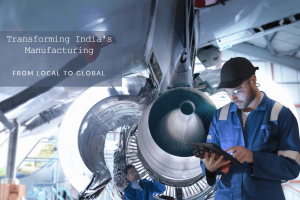The manufacturing sector has long been the backbone of economies worldwide, driving innovation, employment, and economic growth. In India, the manufacturing industry plays a crucial role in shaping the nation’s economic landscape, contributing significantly to GDP and employment. The resilience and adaptability of the manufacturing sector, even amid global challenges, highlight its importance in the overall economic framework. This article delves into the growth, challenges, and future prospects of the manufacturing sector.
Understanding the Manufacturing Sector
Manufacturing involves the transformation of raw materials into finished goods through processes that include designing, assembling, and testing. This sector covers various industries, from automobiles and electronics to textiles and pharmaceuticals. It is essential for creating value, driving technological advancement, and boosting exports.
The Significance of the Manufacturing Sector in India
India’s manufacturing sector is a cornerstone of its economic growth, providing employment to millions and contributing approximately 17% to the GDP. The government’s “Make in India” initiative has further emphasized the importance of manufacturing, aiming to make India a global manufacturing hub.
Key Highlights of the Manufacturing Sector:
- Employment Generation: The manufacturing industry is a significant employer, creating jobs across different skill levels, from factory workers to engineers and managers.
- Economic Growth: By contributing to exports and reducing import dependence, manufacturing boosts economic stability.
- Technological Innovation: The sector drives innovation through research and development, fostering advancements in technology and processes.
- Supply Chain Development: A robust manufacturing sector strengthens the supply chain, benefiting ancillary industries and suppliers.
Key Trends in the Manufacturing Sector
The manufacturing landscape is rapidly evolving due to technological advancements, changing consumer preferences, and global competition. Here are some key trends shaping the manufacturing sector:
- Adoption of Industry 4.0: The integration of smart technologies such as IoT, AI, and robotics is transforming manufacturing processes, enhancing efficiency and reducing costs.
- Sustainability and Green Manufacturing: There is a growing focus on sustainable practices, with manufacturers adopting eco-friendly methods to reduce carbon footprints.
- Digital Supply Chains: Digitalization is streamlining supply chain operations, enhancing transparency, and improving inventory management.
- Reshoring and Local Manufacturing: Companies are increasingly bringing manufacturing operations closer to home to reduce dependency on foreign suppliers and improve resilience.
Challenges Facing the Manufacturing Sector
Despite its growth, the manufacturing sector faces several challenges that need to be addressed for sustained progress:
- Infrastructure Gaps: Poor infrastructure, such as inadequate power supply and outdated logistics, can hinder manufacturing efficiency.
- Skilled Workforce Shortage: A shortage of skilled labor remains a significant challenge, highlighting the need for focused training and education programs.
- Compliance and Regulatory Hurdles: Complex regulations and compliance requirements can slow down operations and increase costs for manufacturers.
- Supply Chain Disruptions: Global events, such as pandemics and geopolitical tensions, can disrupt supply chains, impacting manufacturing output.
Opportunities for Growth in the Manufacturing Sector
The manufacturing sector has immense potential for growth, driven by various government initiatives and global market trends. Here are some opportunities that can be leveraged:
- Government Initiatives: Programs like Make in India, Production Linked Incentive (PLI) schemes, and Skill India are designed to boost manufacturing capabilities and employment.
- Export Potential: There is an increasing demand for Indian manufactured goods globally, providing opportunities to enhance exports.
- Technological Upgradation: Investing in modern technologies can improve production efficiency, reduce costs, and open new market opportunities.
- Focus on MSMEs: Micro, Small, and Medium Enterprises (MSMEs) are pivotal in manufacturing. Support for these businesses through financing and technological assistance can drive sector growth.
Strategies for Building a Successful Manufacturing Business
Starting and running a successful manufacturing business involves careful planning and strategic decision-making. Here are some essential strategies:
- Market Research and Product Development: Understanding market demand, consumer needs, and competitor offerings is crucial. Invest in research and development to create unique, high-quality products.
- Investment in Technology: Adopting the latest technology can enhance production capabilities, improve quality control, and reduce wastage.
- Focus on Quality and Compliance: Ensuring compliance with industry standards and regulations is vital for maintaining quality and gaining consumer trust.
- Robust Supply Chain Management: Building a resilient supply chain helps mitigate risks and ensures the timely availability of raw materials.
- Sustainability Practices: Implementing eco-friendly practices can reduce environmental impact and appeal to a growing base of environmentally conscious consumers.
Future of the Manufacturing Sector in India
The future of India’s manufacturing sector looks promising, with increasing investments, government support, and technological advancements. The sector is expected to grow rapidly, contributing significantly to India’s goal of becoming a $5 trillion economy by 2025.
Key Drivers of Future Growth:
- Digital Transformation: The ongoing digital revolution will continue to enhance manufacturing processes, improving efficiency and product quality.
- Global Supply Chain Realignment: India has the potential to become a key player in global supply chains as companies diversify their manufacturing bases.
- Sustainable Manufacturing: Emphasis on sustainability will drive innovation in green technologies, making Indian manufacturing more competitive on the global stage.
- Focus on Skill Development: Enhanced focus on training and upskilling the workforce will address the talent gap, ensuring that manufacturers have access to skilled labor.
Conclusion
The manufacturing sector’s resilient growth story is a testament to its pivotal role in India’s economic development. By leveraging technology, embracing sustainability, and navigating challenges, the manufacturing sector can unlock new opportunities and drive economic prosperity. For aspiring manufacturers, the time is ripe to tap into this thriving sector and contribute to India’s industrial renaissance.
______________________________
Read these stories also:
Fueling Growth: How Indian Coworking Spaces Empower SMEs and Startups
Startup Funding Trends for 2024: Navigating the Path to Success
_________________________________
For more insights on SME, Startups and Businesses, visit BharatiyaMedia.com. For editorial inquiries, email sharma.maayank@yahoo.com, and for advertisements and other enquiries, contact us at contact@entrepreneur.org.in.












Add Comment